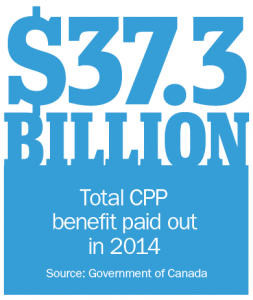The new pension debate
The Liberals are promising a bigger CPP. Nobody knows the details but everyone’s got suggestions
Advertisement
The Liberals are promising a bigger CPP. Nobody knows the details but everyone’s got suggestions
 Of course, whether or not there should be a CPP boost at all is still up for debate. Hamilton, for one, isn’t convinced that there’s a pension crisis in Canada but says too many people expect it to happen.
Still, if a bigger CPP is coming, he doesn’t want it changed for people earning less than $25,000, as that income is already covered by the benefits that Canadians receive. Instead, a CPP increase should be applied to any income above $25,000 and up to $125,000, where existing benefits are wanting. “Higher income earners will have to pay more into the plan,” Hamilton notes, “but they’ll get more back at the end.”
Of course, whether or not there should be a CPP boost at all is still up for debate. Hamilton, for one, isn’t convinced that there’s a pension crisis in Canada but says too many people expect it to happen.
Still, if a bigger CPP is coming, he doesn’t want it changed for people earning less than $25,000, as that income is already covered by the benefits that Canadians receive. Instead, a CPP increase should be applied to any income above $25,000 and up to $125,000, where existing benefits are wanting. “Higher income earners will have to pay more into the plan,” Hamilton notes, “but they’ll get more back at the end.”
Share this article Share on Facebook Share on Twitter Share on Linkedin Share on Reddit Share on Email